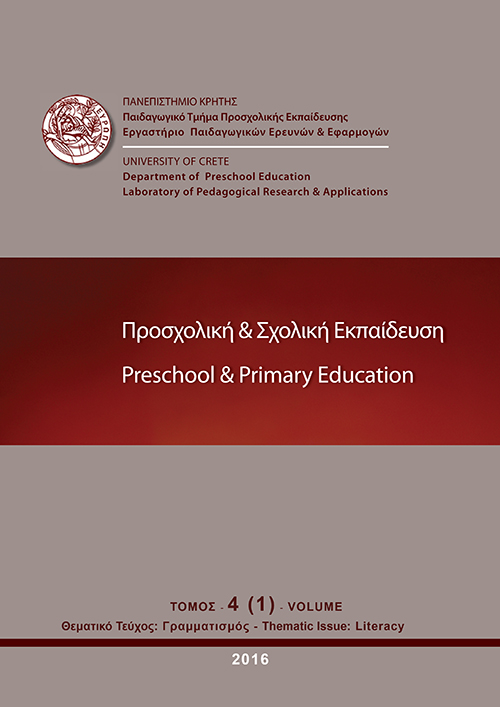Η συμβολή της μορφολογικής επίγνωσης στα πρώτα στάδια ανάπτυξης της ικανότητας ορθογραφημένης γραφής
Résumé
Σκοπός της παρούσας διαχρονικής έρευνας ήταν να εξετάσει το βαθμό συμβολής της μορφολογικής επίγνωσης που διαθέτουν τα παιδιά στο Νηπιαγωγείο και στην Α΄ τάξη δημοτικού στην ανάπτυξη της ικανότητας ορθογραφημένης γραφής κλιτικών επιθημάτων στην Α΄ τάξη και στη Β΄ τάξη αντίστοιχα. Διακόσια δεκαπέντε παιδιά από το Νηπιαγωγείο έως και την Α΄ τάξη του δημοτικού αξιολογήθηκαν ως προς: (α) το επίπεδο ανάπτυξης της μορφολογικής τους επίγνωσης με διάφορες δοκιμασίες (π.χ. αναλογίας λέξεων, σχηματισμού – αποσχηματισμού παράγωγων λέξεων, αναστροφής συνθέτων), (β) γενικές γνωστικές δεξιότητες (μη λεκτική νοημοσύνη, γλωσσική νοητική ικανότητα, βραχύχρονη μνήμη, λεξιλόγιο), και (γ) πρώιμες δεξιότητες γραμματισμού (φωνολογική επίγνωση, αυτοματοποιημένη ονομασία ερεθισμάτων, γνώση γραμμάτων). Παράλληλα, στην Α΄ τάξη και στη Β΄ τάξη τα παιδιά αξιολογήθηκαν ως προς την ικανότητα ορθογραφημένης γραφής κλιτικών επιθημάτων σε λέξεις και ψευδολέξεις. Τα αποτελέσματα ιεραρχικών παλινδρομικών αναλύσεων έδειξαν ότι η μορφολογική επίγνωση των παιδιών στο Νηπιαγωγείο και στην Α΄ τάξη προέβλεψε σημαντικά την επίδοση στην ορθογραφημένη γραφή των κλιτικών επιθημάτων μόνο στις λέξεις, στην Α΄ τάξη και στη Β΄ τάξη αντίστοιχα, ανεξάρτητα από την επίδραση των γνωστικών και γλωσσικών δεξιοτήτων. Συνολικά, τα ευρήματα αυτά δείχνουν ότι η μορφολογική επίγνωση μπορεί να αποτελεί προγνωστικό δείκτη της ανάπτυξης της ικανότητας ορθογραφημένης γραφής ακόμη και κατά την πρώτη σχολική ηλικία.
Λέξεις κλειδιά: μορφολογική επίγνωση, ορθογραφημένη γραφή κλιτικών επιθημάτων
Summary.Recent research studies in several alphabetic orthographic systems have shown a significant contribution of morphological awareness in the development of spelling ability. It is assumed that awareness of morphemes facilitates understanding and the appropriate application of morphophonemic principles of spelling. However, apart from its effect on understanding the conventions of the general spelling system of a language, morphological awareness seems to facilitate the orthographic performance of specific morphemes as well, especially inflectional suffixes, through their morphemic differentiation. The aim of this longitudinal study was to examine the contribution of morphological awareness in Kindergarten and Grade 1, on children’s spelling ability of inflectional suffixes in both Grades 1 and 2. Two hundred and fifteen Greek – speaking children from Kindergarten up to Grade 1 were assessed on measures of: (a) morphological awareness (e.g., word analogy, decomposition of derivative words, reversing compounds), (b) general cognitive skills (nonverbal intelligence, verbal intelligence, short-term memory, vocabulary), and (c) early literacy skills (phonological awareness, rapid automatized naming, letter knowledge). Also, in both Grades 1 and 2 children were assessed on measures of spelling ability of inflectional suffixes in words and pseudowords. The results of the hierarchical regression analyses showed that the morphological awareness of children in both Kindergarten and Grade 1 predicted significantly their spelling of inflectional suffixes only in words, in Grades 1 and 2 respectively, beyond the effects of cognitive and language skills. Morphological awareness skills did not contribute significantly on children’s’ spelling of inflectional suffixes in pseudowords. Overall, these findings highlight that early morphological awareness skills contribute significantly to the development of spelling ability even at the early primary school years. Therefore, it is suggested that the teaching of spelling inflectional suffixes has to emphasize the semantic and syntactic role of inflectional suffixes through activities of writing rather than memorizing rules for the correct spelling of each inflectional suffix.
Keywords: morphological awareness, spelling of inflectional suffixes
Article Details
- Comment citer
-
Grigorakis, I., & Manolitsis, G. (2016). Η συμβολή της μορφολογικής επίγνωσης στα πρώτα στάδια ανάπτυξης της ικανότητας ορθογραφημένης γραφής. Preschool and Primary Education, 4(1), 128–148. https://doi.org/10.12681/ppej.8581
- Rubrique
- Άρθρα

Ce travail est disponible sous licence Creative Commons Attribution - Pas d’Utilisation Commerciale - Partage dans les Mêmes Conditions 4.0 International.
Οι συγγραφείς των άρθρων που δημοσιεύονται στο ΠΡΟΣΧΟΛΙΚΗ & ΣΧΟΛΙΚΗ ΕΚΠΑΙΔΕΥΣΗ διατηρούν τα δικαιώματα πνευματικής ιδιοκτησίας επί των άρθρων τους, δίνοντας στο περιοδικό το δικαίωμα της πρώτης δημοσίευσης. Άρθρα που δημοσιεύονται στο ΠΡΟΣΧΟΛΙΚΗ & ΣΧΟΛΙΚΗ ΕΚΠΑΙΔΕΥΣΗ διατίθενται με άδεια Creative Commons 3.0 και σύμφωνα με την άδεια μπορούν να χρησιμοποιούνται ελεύθερα, με αναφορά στο/στη συγγραφέα και στην πρώτη δημοσίευση για μη κερδοσκοπικούς σκοπούς και με δικαίωμα τροποποίησης μόνον με παρόμοια διανομή (αν αναμείξετε, τροποποιήσετε, ή δημιουργήσετε πάνω στο υλικό, πρέπει να διανείμετε τις δικές σας συνεισφορές υπό την ίδια άδεια όπως και το πρωτότυπο). To Εργαστήριο Παιδαγωγικών Ερευνών και Εφαρμογών του Παιδαγωγικού Τμήματος Προσχολικής Εκπαίδευσης του Πανεπιστημίου Κρήτης και το Εθνικό Κέντρο Τεκμηρίωσης διατηρούν το δικαίωμα να δημοσιεύουν, να αναπαραγάγουν, να παρουσιάζουν στο κοινό, να διανέμουν και χρησιμοποιούν άρθρα που δημοσιεύονται στο ΠΡΟΣΧΟΛΙΚΗ & ΣΧΟΛΙΚΗ ΕΚΠΑΙΔΕΥΣΗ σε οποιοδήποτε μέσο και μορφή είτε μεμονωμένα είτε ως μέρη συλλογικών έργων, για όλο το χρόνο διάρκειας προστασίας της πνευματικής ιδιοκτησίας και για όλες τις χώρες του κόσμου. Αυτό περιλαμβάνει ενδεικτικά και όχι αποκλειστικά, το δικαίωμα δημοσίευσης των άρθρων σε τεύχη του περιοδικού ΠΡΟΣΧΟΛΙΚΗ & ΣΧΟΛΙΚΗ ΕΚΠΑΙΔΕΥΣΗ, αναπαραγωγής και διανομής μεμονωμένων αντιγράφων των άρθρων, αναπαραγωγής ολόκληρων των άρθρων σε άλλη έκδοση του Εργαστηρίου Παιδαγωγικών Ερευνών και Εφαρμογών του Παιδαγωγικού Τμήματος Προσχολικής Εκπαίδευσης του Πανεπιστημίου Κρήτης και του Εθνικού Κέντρου Τεκμηρίωσης και αναπαραγωγής και διανομής των άρθρων ή περίληψης αυτών με χρήση πληροφορικού συστήματος αποθετηρίου.



